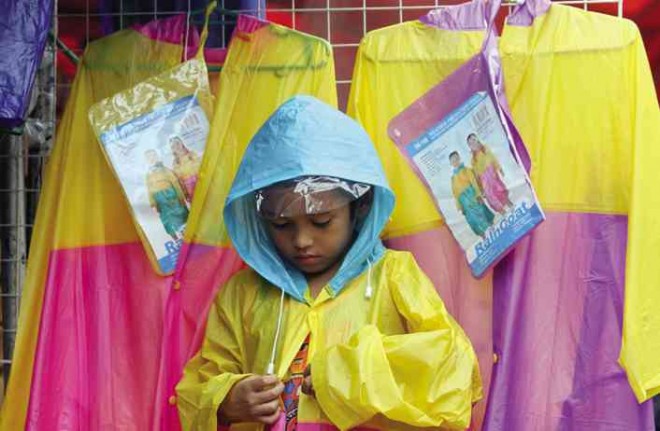Kids may be dry but still in danger wearing ‘toxic raincoats’

GEARING UP A child tries on a raincoat at the Divisoria market district in Manila on Saturday. NIÑO JESUS ORBETA
Toxic rain gear may protect children against the common cold but they can make kids sicker in the long run.
An environmental advocacy group on Saturday said raincoats from discount retail stores in Manila and Pasay City contained high levels of the toxic metal lead.
The EcoWaste Coalition cautioned parents against buying raincoats made of polyvinyl chloride (PVC) plastic which, they said, contains toxic additives, particularly lead, that can harm the brain and the central nervous system and even disrupt the normal functions of the endocrine system.
According to EcoWaste, five out of six PVC raincoats the group bought last month from stores in Divisoria and Baclaran—at prices ranging from P130 to P200—were found to contain lead.
The June 25 results from an analysis of the items conducted by global testing company SGS revealed that they contained up to 574 parts per million (ppm) of lead, way above the allowable 100 ppm limit in accessible substrate materials under the US Consumer Product Safety Improvement Act.
Article continues after this advertisementAmong the items EcoWaste sampled were: Two Tweety Bird yellow raincoats with 574 ppm and 190 ppm of lead; a yellow student raincoat with 243 ppm of lead; a Winnie the Pooh yellow raincoat with 217 ppm of the toxic metal; and a Mickey Mouse blue raincoat with 164 ppm.
Article continues after this advertisement“While it is true these rain coats can prevent kids from getting wet, the lead and other hazardous substances on the PVC plastic material or design may make them sick in the long term and pollute the environment as well,” said EcoWaste Project Protect coordinator Thony Dizon.
He said when old PVC raincoats are discarded, the lead and other toxins they contain are discharged into the environment.
Dizon said children are vulnerable to such toxins because they are prone to hand-to-mouth activities and their vital organs and systems are still developing.
He advised parents to buy only non-PVC rain gear and to constantly check the condition of the products kids use to look for signs of wear and tear. Children, he said, should always be reminded to wash their hands after playing and before eating.
EcoWaste asked local manufacturers to strictly abide by the provisions of the Department of Environment and Natural Resources’ Chemical Control Order for Lead and Lead Compounds.
They said manufacturers should phase out lead and other toxic chemicals in the production process, disclose the chemical content of their products and respect the consumers’ right to know through complete and truthful labeling.
Lead, which can be ingested or inhaled, is most dangerous for children because it can damage or retard brain development, causing shorter attention span, learning disabilities, lower intelligence quotient scores, poor control of impulses and aggressive behavior.